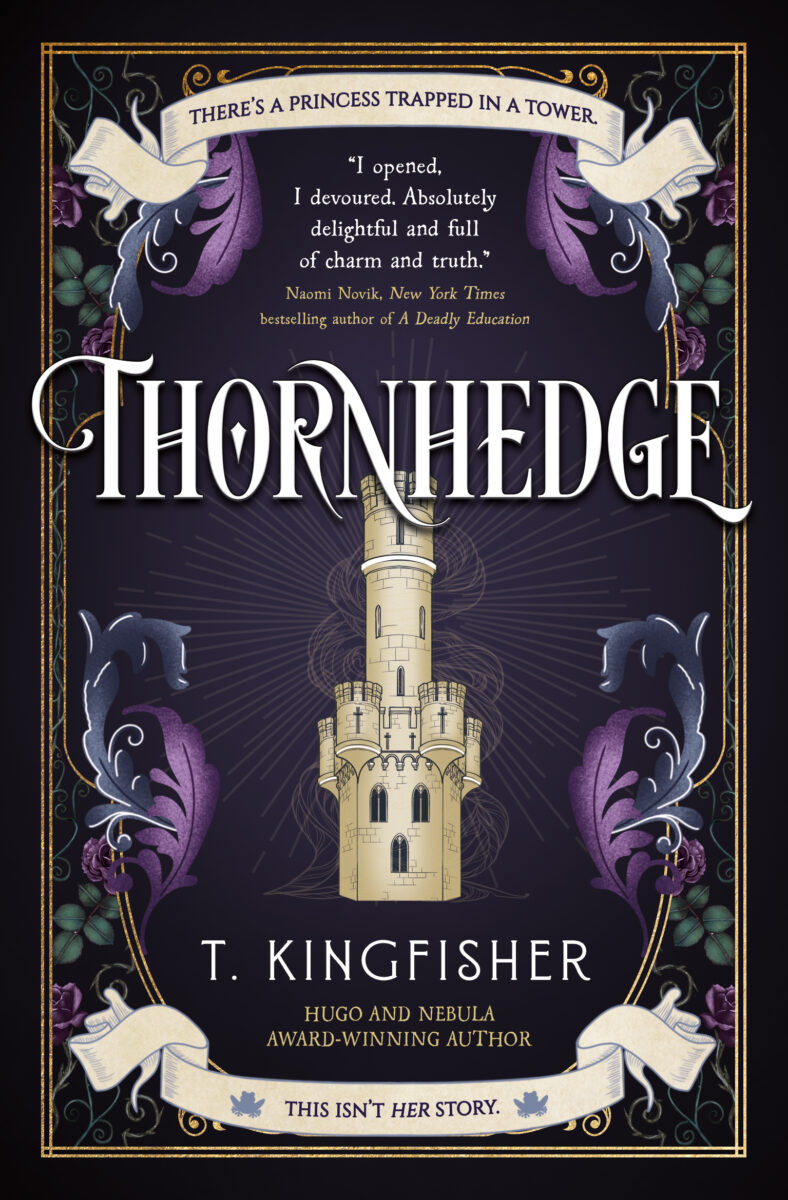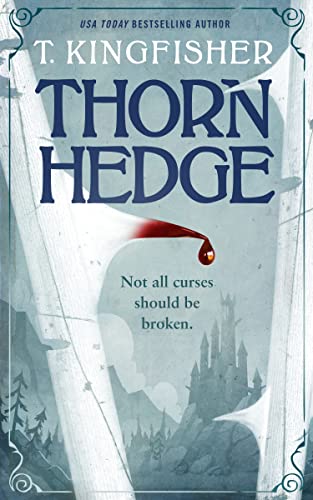Based purely on growing up in the Disney era of fairy tales, at one point I would have said that Sleeping Beauty is the lamest of heroines. Problematic, of course, but also just boring. Clearly just a tale invented by a parent who really, really wanted to go to bed! But I’m so glad that several writers have undertaken a rehabilitation of the story, especially T. Kingfisher, who has now done it twice, albeit for different audiences.

Kingfisher’s first take was in her young reader/middle grade novel Harriet the Invincible, a slightly wackier take that included, among other things, cliff-diving and grumpy hamsters. Now with Thornhedge, there’s a version for adults that leans in to the horror. As per usual, Kingfisher hasn’t entirely dispensed with wackiness, but her trademark humor is a balm in what could otherwise be a grim tale of loss, cruelty, and painful secrets.
If I didn’t already have a shelf dedicated to T. Kingfisher books, I’d be shelving Thornhedge beside Neil Gaiman’s “Snow, Glass, Apples,” or Seanan McGuire’s Wayward Children series. There’s an undeniable coming-of-age element to this novella, even if it takes a bit longer than your traditional youthful journey. Two hundred years longer, actually, give or take.
Yes, the story of Toadling takes a few centuries to get going, but this isn’t The Fellowship of the Ring. The progress of years is swift, and we get to experience the narrative in two parts, both present-day Toadling as she tries to dissuade an errant knight from chopping his way to the tower behind the thorns, and past Toadling as she does her best to fulfill a prophecy she never had much faith she could even deliver.
Originally, Toadling was only meant to magically inhibit a new evil. However, a tragic blunder meant Toadling had to assume far more responsibility than she ever wanted. She only ever wanted to belong among the greenteeth, the not-actually-but-definitely-could-be-British fairies who are equal parts horrifying and awesome, but now she’s in the human realm.
The broad strokes of the settings are familiar: medieval Europe, castles, fairies, curses. But it shades quickly into the new: unprecedented fey, unknown gods, and—hey, look at that—presence of non-European peoples and cultures. The knight of this tale is Halim, who is a wonderfully patient and curious person (and nice to his mother!), but maybe not cut out for the derring-do side of errantry. He’s less of a jouster and more of an anthropologist, and he really wants to know what’s up with the thorns.

With the characteristic charm, frankness, and essential goodness that so many T. Kingfisher heroines display, Toadling is a perfect guide to this world at half-turn. She finds it as strange as we do, but she gamely tries her best to be helpful. Halim, too, just wants to be of use, even if he knows he’s not cut out for the violence so often assumed to be synonymous with heroism.
In that sense, there aren’t really any heroes, except in that most ordinary people who try to do good are heroes. And there isn’t evil so much as there’s selfishness, but at a level of narcissistic disregard for others that to call it evil wouldn’t be too far off. Kingfisher’s antagonist here is both pitiable and truly awful, a great addition to her growing pantheon of villains.
Thornhedge really made me consider broader fantasy tropes, too: the novella gently critiques both the SFF tendency toward Absolute Good vs. Absolute Evil, but also all the stories that insist that a hero can love someone so hard that they stop being bad.
There’s nothing inherently wrong with those kinds of narratives. It’s just that Thornhedge has a caveat or two, a gentle reminder that sometimes there’s only the choice between bad and worse, and that love doesn’t fix power (or sociopathy). So what do you do when you can’t defeat your enemy with either a good sword or good intentions?
That conundrum is the crux of Thornhedge, and those of you who love the Steven Universe approach (hey, me too) will be happy to know that the power of friendship and family still does play a part. It just can’t be the only solution. We aren’t always equipped with either the power or the time to create an ideal solution, one in which everyone is happy and healed. Instead we can only try to do the most good for the most people, and hope that it’s enough.
Another splendid addition to the Kingfisher canon, Thornhedge reminds you that true fairy tales have teeth.
Thornhedge will be published August 15, 2023.
